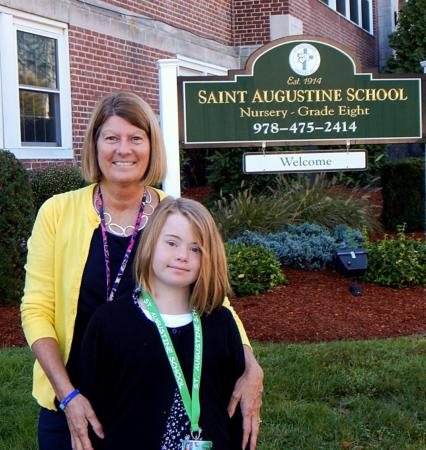
Culture
In a recent Pilot column, Superintendent of Schools for the Archdiocese of Boston Kathy Mears reminisced about the year she taught a student with a learning disability. At the time, students with learning disabilities were frequently denied access to Catholic schools. However, Mears felt confident she could teach this student and proceeded to do so with success. Now as superintendent, Mears' is continuing her mission to include all students. "Enrolling students with special needs is something we want to continue. By doing this, the schools can serve more students," she shared.
Inclusion within parochial schools remains relatively new, with only a small percentage of schools across our nation taking progressive steps to welcome students with disabilities. Some may question why progress in this area is necessary given that Catholic schools have for decades attracted the best and brightest student demographic. The answer can be found simply by looking at our parishes and communities that are filled with diversity due to population explosion, immigration, and greater variation in ability levels. This steady emulsion has created new opportunities for Catholic schools, some of which are now experiencing an organic blending of student populations, surpassing socio-economic boundaries, ability, and culture, all while leveraging the most relevant tie between us: our faith.
Most often, students with disabilities attend public schools staffed with teachers trained in special education alongside physical, occupational, and speech therapists, counselors, and paraprofessionals. Unfortunately, population growth and tightening budgets have impacted how successfully public school systems can support children with learning delays. The solutions most often employed are substantially-separate, life skills-based classrooms which segregate students from same-aged, neurotypical counterparts. The flaw in this model however is that it not only stimulates invisible social boundaries between children, but available research also indicates that segregated learning is detrimental to students of differing abilities, many of whom learn more effectively when included alongside their peers.
For Catholic schools, the challenge of inclusion increases given already-tight operating budgets and teaching staffs that may have little or no experience educating students with disabilities. Fortunately, several organizations exist to support progressive administrators and schools through this evolution including the FIRE Foundation and the National Catholic Board on Full Inclusion. The National Catholic Board on Full Inclusion, for example, serves as a central resource to educate teachers, parents, principals, and priests interested in creating inclusive learning environments that accept and value every child. The organization's founder, Beth Foraker, is not only a mother of four, but a credentialed teacher who understands what is being asked of Catholic schools when contemplating inclusive environments.
"Catholic education is something very special, and families of children with disabilities are often told that public schools can meet the needs of their child better," Foraker said. "Catholic schools however have a secret spice and elements of community, faith, spiritual companionship, connection and social justice within, as well as an invisible essence I call, 'grace.'"
A case study in the journey towards inclusion
Here in our archdiocese, St. Augustine School in Andover is becoming a model for successful inclusion. Led by 38-year veteran teacher-turned-administrator Paula O'Dea, this school has continually embraced the diversity of surrounding communities. St. Augustine's student population consists of students from lower-income neighborhoods, international exchange students, those with learning disabilities, and students with various medical diagnoses. In fact, St. Augustine's is one of the first Catholic schools in Massachusetts to accept a student with Down syndrome, who happens to be my daughter, Abigail "Abby" Agudelo.
By taking the monumental step to accept Abby, Principal O'Dea and St. Augustine School are demonstrating lessons set forth by St. Augustine himself who said, "Do not be content with what you are, if you want to become what you are not yet. Always add something more, keep moving forward, always make progress."
When we first approached Principal O'Dea about our daughter, we were met with cautious optimism. Recognizing that accepting Abby as a student would be a commitment, staff also saw it as an opportunity. After four months of testing, research, planning, and prayerful consideration, Abby was warmly welcomed into kindergarten. Five years later, she is a fully-included fourth grader who operates independently and has the support of her schoolmates, a dialed-in teaching staff, and progressive administrators. Further validating the school's commitment, Principal O'Dea expanded her teaching staff to include a Special Education teacher this year.
"Any change can be difficult. Our goal is to provide the most comprehensive educational experience for every student," said Principal O'Dea. "By populating our school with diversity, students have experiences they may not have otherwise."
Undoubtedly, the presence of students with differing abilities teaches acceptance, while proving that differences don't define us, rather, they showcase our unique gifts. Through inclusion, school leaders are practicing and living the faith they work so hard to instill, while modeling behaviors to embrace diversity, raise up the fragile, and include the less gifted and encumbered. For our family, St. Augustine School has been both a gift and a blessing. All three of our children attend a school that provides a more current and accurate definition of "disability," while normalizing the uniqueness of our diverse population.
Last month, Abby took the reins of the school as "principal for a day," a reward secured at the school's annual fundraiser, and was met by loud cheers as she led morning prayer. She visited classrooms, staffed the lunchroom, and had a special lunch with school administrators, during which she pontificated on the importance of "hamburger day" and recess. She also created a one-day fundraiser, "Buck for your Buddy," which collected more than $800, earning honors as the most participated in fundraiser in the school's history.
St. Augustine School truly demonstrates the hope and progress Kathy Mears wrote about in The Pilot. Saying yes to inclusion will ensure our youth gain a truer sense of the world around them during their formative years. All it takes is the right attitude, support, and a big leap of faith.
Recent articles in the Culture & Events section
-
Scripture Reflection for April 14, 2024, Third Sunday of EasterDeacon Greg Kandra
-
St. Helena's House is established in the South EndThomas Lester
-
Is this synodality?Russell Shaw
-
Poking the hornet's nest of IVFFather Tadeusz Pacholczyk
-
A eucharistic word: MissionMichael R. Heinlein


















